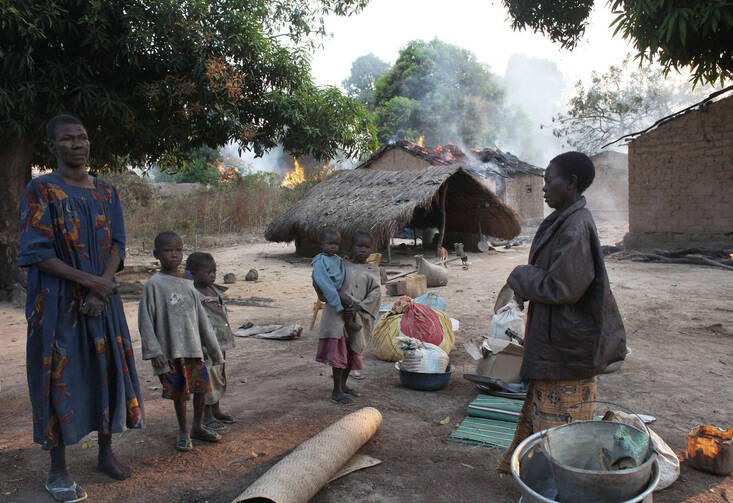United Nations peacekeepers and officials struggled to contain two ongoing crises in Africa as the New Year began. As the world’s newest nation South Sudan sank deeper into a de facto civil war, peace talks to end the sudden conflict began in Ethiopia. Meanwhile in the neighboring Central African Republic tensions continued to simmer between majority Christians and minority Muslims.
In South Sudan, at least 1,000 people have died and 200,000 people have been displaced as a result of weeks of often intense fighting between political supporters of President Salva Kiir and South Sudan’s ousted vice president Riek Machar. The violence, which flared out of a political struggle between the two leaders within the Sudan People’s Liberation Movement, has ignited ethnic tensions between the supporters of both men. President Kiir is a member of the South Sudan’s Dinka tribe and Machar is a member of the Nuer tribe. President Kiir has declared a state of emergency for the areas that have fallen under rebel control, including the central city, Bor.
Both groups have sent delegations to Ethiopia for peace talks. The leading U.N. official in South Sudan, Hilde Johnson, urged leaders to bring the situation “back from the brink.”
As the violence in South Sudan escalates and tens of thousands of civilians take refuge in U.N. compounds around the country, children are in grave danger, according to a report from UNICEF. “An estimated 81,000 civilians have fled their homes, the majority of them women and children, but we believe that with the situation changing so rapidly the actual numbers are likely to be higher,” UNICEF’s Representative in South Sudan, Iyorlumun Uhaa, said.
“We are especially worried about those in and around Bor, in Jonglei State, where the fighting has recently been heaviest. There are desperate shortages of food and clean water at the U.N. compound there and the lack of sanitation facilities poses a high risk of disease. Children, always among the most vulnerable in conflict, are spending their days without shelter in the intense heat and sun and sleeping in the open during the cold nights,” he said.
Although the intense fighting is making it difficult to reach civilians sheltering in the U.N. compound in Bor, aid is being delivered to the two U.N. compounds in Juba, where an estimated 20,000 people have taken refuge.
The United Nations was also busy attempting to restore the peace in the Central African Republic. Despite the intervention of French and African troops, the situation in the Central African Republic, remains precarious. "The Central African Republic remains on the verge of a war with religious aspects" warned Mgr. Dieudonné Nzapalainga, Archbishop of Bangui, and Omar Kobine Layama, Imam of the Central African capital, in a joint appeal.
"Nearly half the population desperately need aid, and about 40,000 people have taken refuge at Bangui airport where they are living without shelter or toilet facilities," report the two religious leaders said. They called on the United Nations to deploy a peacekeeping force "with the utmost urgency.”
Persistent violence in C.A.R. between Christian militias and the mainly Muslim Seleka rebel group that overthrew President François Bozizé in March has forced one-fifth of the population to flee their homes. According to the most recent U.N. estimates, the number of internally displaced people in Bangui alone has risen to some 513,000 people—half the capital city’s residents—since Dec. 5. U.N. sources say the security situation remains tense with serious risks of deterioration in and outside Bangui and serious consequences for humanitarian assessments and response. Armed groups continue to launch targeted attacks, including against international security forces.
UNICEF reports that in the ongoing violence that has gripped Bangui attacks against children have sunk to a vicious new low, with at least two children beheaded, and one of them mutilated. “We are witnessing unprecedented levels of violence against children. More and more children are being recruited into armed groups, and they are also being directly targeted in atrocious revenge attacks,” said Souleymane Diabate, UNICEF Representative in C.A.R.
UNICEF and partners have verified the killings of at least 16 children and injuries among 60. Diabate said that armed elements were accountable for taking specific measures to provide this crucial protection to children. These included: Clear directives by those in positions of authority within armed forces and groups to halt grave violations against children, including that children not be recruited into the fighting, nor targeted; the immediate release of children associated with armed forces and groups and their protection from reprisals; transit centers set up for the release and reintegration of children must also be protected from attacks; prohibiting attacks against health and education personnel, and the use of civilian spaces such as schools and hospitals for military purposes; allowing safe, unhindered passage of impartial humanitarian assistance.
"The situation is very chaotic and worsening all the time," said Msgr. Cyriaque Gbate Doumalo, secretary-general of the Catholic bishops' conference. "All our churches and parishes are inundated with displaced people… Whole districts of Bangui are deserted, while even those in the relative safety of Catholic centers are living in total fear," he said.
Msgr. Doumalo said that 12,000 more displaced civilians had sought refuge in Bangui's major seminary, while the bishops' conference secretariat was sheltering 600 people, half of them children. He said many children had been abandoned when their parents were killed or fled and were now without food and clothing and "at the mercy of armed groups."
Bishop Nestor-Desire Nongo Aziagbia of Bossangoa urged the deployment of more U.N. forces. "We need a bigger peacekeeping mission here; the present force is plainly unable to cope or play an effective role," the bishop said. "Without this, things are certain to get difficult. Unless the huge quantities of guns now in popular circulation are collected, people will continue killing each other."








